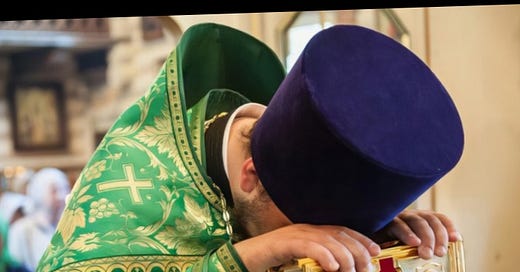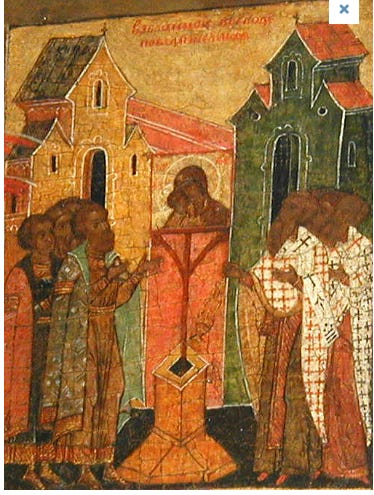“But nothing causes such exceeding grief as when anyone, lying under the captivity of sin, calls to mind from where he has fallen, because he turned aside to carnal and earthly things, instead of directing his mind in the beautiful ways of the knowledge of God. So you find Adam concealing himself, when he knew that God was present and wishing to be hidden when called by God with that voice which wounded the soul of him yourself? Why are you concealed? Why do you avoid Him Whom you once longed to see? A guilty conscience is so burdensome that it punishes itself without a judge, and wishes for covering, and yet is bare before God.”
+ St. Ambrose Milan, Concerning Repentance, Book II
Daily Scripture Reading
1 Corinthians 15:12-19 (Epistle)
12 Now if Christ is preached that He has been raised from the dead, how do some among you say that there is no resurrection of the dead?
13 But if there is no resurrection of the dead, then Christ is not risen.
14 And if Christ is not risen, then our preaching is empty and your faith is also empty.
15 Yes, and we are found false witnesses of God, because we have testified of God that He raised up Christ, whom He did not raise up – if in fact the dead do not rise.
16 For if the dead do not rise, then Christ is not risen.
17 And if Christ is not risen, your faith is futile; you are still in your sins!
18 Then also those who have fallen asleep in Christ have perished.
19 If in this life only we have hope in Christ, we are of all men the most pitiable.
Matthew 21:18-22 (Gospel)
18 Now in the morning, as He returned to the city, He was hungry.
19 And seeing a fig tree by the road, He came to it and found nothing on it but leaves, and said to it, “Let no fruit grow on you ever again.” Immediately the fig tree withered away.
20 And when the disciples saw it, they marveled, saying, “How did the fig tree wither away so soon?”
21 So Jesus answered and said to them, “Assuredly, I say to you, if you have faith and do not doubt, you will not only do what was done to the fig tree, but also if you say to this mountain, ‘Be removed and be cast into the sea,’ it will be done.
22 And whatever things you ask in prayer, believing, you will receive.”
The Meeting of the “VLADIMIR” Icon of the Mother of God (in commemoration of the deliverance of Moscow from the invasion of Tamerlane in 1395).
The Vladimir Icon of the Mother of God was painted by the Evangelist Luke on a board from the table at which the Savior ate together with His All-Pure Mother and Righteous Joseph. The Mother of God, upon seeing this image, exclaimed, “Henceforth, all generations shall call Me blessed. The grace of both My Son and Me shall be with this icon.”
In the year 1131, the icon was sent from Constantinople to Rus to holy Prince Mstislav (April 15) and was installed in the Devichi monastery in Vyshgorod, the ancient appanage city of the holy Equal of the Apostles Princess Olga.
The son of George Dolgoruky, Saint Andrew Bogoliubsky, brought the icon to the city of Vladimir in 1155 and installed it in the renowned Dormition cathedral which he built. At this time the icon received its name of “the Vladimir Icon.” The icon was first brought to Moscow in the year 1395. Thus, the blessing of the Mother of God established the spiritual bonds of Byzantium and Rus via Kiev, Vladimir and Moscow.
The festal celebration of the Vladimir Icon of the Most Holy Theotokos occurs several times during the year (21 May, 23 June and 26 August). The most solemn celebration occurs on August 26, the Feast established in honor of the Meeting of the Vladimir Icon upon its Transfer from Vladimir to Moscow.
Of Boasting and Modesty
The word of the day is “boast.” Our society sees achievement as a sufficient reason be proud of ourselves. It sees nothing wrong with football players who do a dance of exaltation when they score or sack the quarterback. But today in our reading of 2 Corinthians 10:7-18, Paul joins the Lord who criticized the Pharisee who congratulated himself in the “Parable of the Pharisee and Publican” (Luke 18:11).
It’s Easy to Boast When One Measures Oneself
Like the Pharisee, Paul’s opponents in Corinth are boasting of their superior powers and gifts. Moreover, they are criticizing Paul’s supposed weakness and lack of talent. But Paul answers with the observation that it is easy to boast when one measures oneself by one’s own standards. The braggart looks at himself through the mirror of his own opinion. He claims all the credit even for what others have contributed and done.
Looking Outward or Inward
But the apostle notes that those who puff themselves up in this way are “not wise” (vs. 12). The arrogant look at their outward appearance and see what they want to see. But St. Paul says that they should look inward and consider whether they are “Christ’s”—and whether they are thinking and acting as if they were Christ’s. Or are they just serving themselves?
Note how St. Paul demonstrates the virtue of modesty. He will not boast “of things beyond measure” or take credit for the accomplishments of others. He does not want to reap where others have planted. But he is resolved to take the Gospel where others have not yet preached it.
For Reflection
St. Anatoly of Optina said, “Where God is—there is peace… wherever the devil is—everything is ruinous, proud, and hostile” (Schaefer 2009, Kindle Loc 885). If boasting is an expression of pride, then wherever there is boasting, we can be sure that Satan is active. He takes over the heart, mind, and mouth of the arrogant.
On the other hand, St. Isaac the Syrian said, “Humility is accompanied by modesty and self-collectedness” (Isaac 2011, Homily 70). Those who are unpretentious are in control of themselves and can act wisely and discreetly.
Works Cited
Isaac, the-Syrian. 2011. Homilies of St. Isaac the Syrian. Edited by Homily 72 St. Isaac the Syrian, Ascetical Homilies of St Isaac the Syrian: Holy Transfiguraton Monastery.
Schaefer, Archimandrite George. 2009. Living Without Hypocrisy: Spiritual Counself of the Holy Elders of Optina. Jordanville, N.Y. : Printshop of St. Job of Pochaev.
This week’s calendar reminders:
Monday 8/26: Matins 8:30 a.m.
Tuesday 8/27: no services or events
Wednesday 8/28: no services or events
Thursday 8/29: Matins 8:30 a.m.
Friday 8/30: Matins 8:30 a.m.
Saturday 8/31: Catechumen Class 4:30 p.m; Great Vespers 6 pm
Sunday 9/1: Divine Liturgy 9: 15 a.m.











